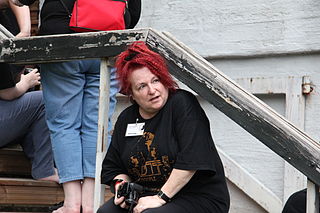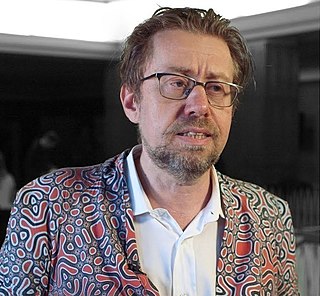A Quote by Alan Watts
But, as Douglas E Harding has pointed out, we tend to think of this planet as a life-infested rock, which is as absurd as thinking of the human body as a cell infested skeleton. Surely all forms of life, including man, must be understood as "symptoms" of the earth, the solar system, and the galaxy in which case we cannot escape the conclusion that the galaxy is intelligent.
Related Quotes
While the Copernican principle comes with no guarantees that it will forever guide us to cosmic truths, it's worked quite well so far: not only is Earth not in the center of the solar system, but the solar system is not in the center of the Milky Way galaxy, the Milky Way galaxy is not in the center of the universe, and it may come to pass that our universe is just one of many that comprise a multiverse. And in case you're one of those people who thinks that the edge may be a special place, we are not at the edge of anything either.
Today the human race is a single twig on the tree of life, a single species on a single planet. Our condition can thus only be described as extremely fragile, endangered by forces of nature currently beyond our control, our own mistakes, and other branches of the wildly blossoming tree itself. Looked at this way, we can then pose the question of the future of humanity on Earth, in the solar system, and in the galaxy from the standpoint of both evolutionary biology and human nature. The conclusion is straightforward: Our choice is to grow, branch, spread and develop, or stagnate and die.
I know what cancer was. How is it like humankind?" Sek Hardeen's perfectly modulated, softly accented tones showed a hint of agitation. "We have spread out through the galaxy like cancer cells through a living body, Duré. We multiply without thought to the countless life forms that must die or be pushed aside so that we may breed and flourish. We eradicate competing forms of intelligent life.
Avice for a human. 87. Dark matter is needed to hold galaxies together. Your mind is a Galaxy. More dark than light. But the light makes it worthwhile. 88. Which is to say: don't kill yourself. Even when the darkness is total. Always know that life is not still. Time is space. You are moving through that galaxy. Wait for the stars.
Kid says to me, "You play baseball? What position? Left out?" and gets a big laugh from the rest of the class. Kid is only one person out of 6.792 billion humans on this planet. This planet is only one-eighth of the solar system, whose sun is one of two billion stars in the Milky Way galaxy. Put it that way, the comment loses it's importance.
We live on a hunk of rock and metal that circles a humdrum star that is one of 400 billion other stars that make up the Milky Way Galaxy which is one of billions of other galaxies which make up a universe which may be one of a very large number, perhaps an infinite number, of other universes. That is a perspective on human life and our culture that is well worth pondering.
To the man who is truly ethical all life is sacred, including that which from the human point of view seems lower in the scale. He makes distinctions only as each case comes before him, and under the pressure of necessity, as, for example, when it falls to him to decide which of two lives he must sacrifice in order to preserve the other. But all through this series of decisions he is conscious of acting on subjective grounds and arbitrarily, and knows that he bears the responsibility for the life which is sacrificed.
If consciousness is the ground of being rather than an epiphenomenon of physical processes, we may find that a basic question asked by modern astronomy and space science- 'Is there life out there?'- should be rephrased. Organic life, as well as intelligence, may already be a property enmeshed in the fabric of the cosmos, brought to fruition through the spiraling dynamics of the solar system and the galaxy, built into the structure of the universe itself.
Science has an uncomfortable way of pushing human beings from center stage. In our prescientific stories, humans began as the focal point of Nature, living on an Earth that was the center of the universe. As the origins of the Earth and of mankind were investigated more carefully, it became clear that Nature had other interests beyond people, and the Earth was less central than previously hoped. Humankind was just one branch of the great family of life, and the Earth is a smallish planet orbiting an unexceptional sun quite far out on one arm of a run-of-the-mill spiral galaxy.










































